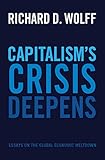A breathtakingly clear analysis that breaks down the root causes of today’s economic crisis
“With unerring coherence and unequaled breadth of knowledge, Rick Wolff offers a rich and much needed corrective to the views of mainstream economists and pundits. It would be difficult to come away from thisÂ… with anything but an acute appreciation of what is needed to get us out of this mess.â€
—Stanley Aronowitz, Distinguished Professor of Sociology and Urban Education, City University of New York
Capitalism Hits the Fan chronicles one economist’s growing alarm and insights as he watched, from 2005 onwards, the economic crisis build, burst, and then change the world. The argument here differs sharply from most other explanations offered by politicians, media commentators, and other academics. Step by step, Professor Wolff shows that deep economic structures—the relationship of wages to profits, of workers to boards of directors, and of debts to income—account for the crisis. The great change in the US economy since the 1970s, as employers stopped the historic rise in US workers’ real wages, set in motion the events that eventually broke the world economy. The crisis resulted from the post-1970s profit explosion, the debt-driven finance-industry expansion, and the sequential stock market and real estate booms and busts. Bailout interventions by the Federal Reserve and the US Treasury have thrown too little money too late at a problem that requires more than money to solve.
As this book shows, we must now ask basic questions about capitalism as a system that has now convulsed the world economy into two great depressions in 75 years (and countless lesser crises, recession, and cycles in between). The book’s essays engage the long-overdue public discussion about capitalism as a system and about the basic structural changes needed not only to fix today’s broken economy but to prevent future crises.
Richard Wolff has been a professor of economics at the University of Massachusetts, Amherst since 1981. He has been a visiting professor in the Graduate Program in International Affairs, at the New School in New York since 2007. Wolff’s major recent interests and publications include studies of US economic history to ascertain the basic structural causes of the current economic crisis and the examination of how alternative economic theories (neoclassical, Keynesian, and Marxian) understand and respond to the crisis in very different ways. His past work involves application of advanced class analysis to contemporary global capitalism. He has written, co-authored, and co-edited many books and dozens of scholarly and popular journal articles. His recent analyses of current economic events appear regularly in the webzine of the Monthly Review. In 2009, Capitalism Hits the Fan, the documentary on the current economic crisis, was released by Media Education Foundation (www.mediaed.org). Visit http://www.rdwolff.com for more information.
Abridged Table of Contents:
Introduction
Part I: Roots of a System’s Crisis
Part II: The Economics of Crisis
1 Capitalism as a Crisis-Prone System
2 The Role of Economic Theory
3 Markets and Efficiency
4 Wages, Productivity, and Exploitation
5 Housing and Debt
6 Government Intervention in the Economy
7 International Dimensions of the Crisis
Part III: Politics of the Crisis
1 Reforms and Regulations as Crisis Solutions
2 Debates over “Socialist†Solutions
3 Anti-Capitalist Politics
Index










